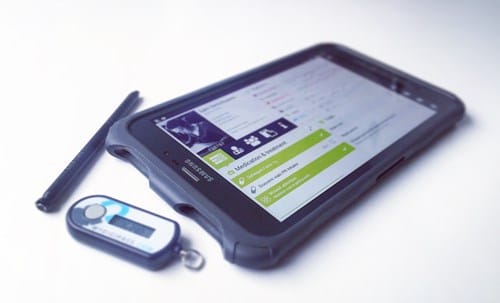The pressure on healthcare workers is building: An aging population is drastically increasing their workload, and there is a large, growing need for tools that increase their work efficiency. Enter Pridiktiv, the digital platform that cuts administrative workload and gives doctors, nurses and specialists more time to spend with their patients.
Digitalization of our daily lives is a phenomenon that can be seen in nearly all facets of society. Healthcare is no different: An avalanche of medical apps, wearables and other high-tech devices is transforming the way our sick and elderly are being treated, assisted and monitored.
A prime example of such a digital healthcare application is Pridiktiv. While many healthcare apps empower patients, Pridiktiv shifts the focus to healthcare workers.
Dragging the healthcare environment into the digital age
“75% of the 65+ population can take care of themselves perfectly well,” says Pridiktiv CEO Jeroen De Backer. “Sometimes they use one of the many health applications to remain independent or monitor their health. Pridiktiv plays its role in the other 25% of the elderly population, where healthcare workers come at regular intervals to provide their services.”
“The workspace of many people has been digitized, but the healthcare sector seems to be lagging behind,” De Backer continues. “Many healthcare workers realize it’s time for a change. With ever-increasing workloads, the need to work more efficiently is huge. Pridiktiv provides the means to do that and more.”
In essence, Pridiktiv is a digital platform that care providers can use to collect and share data on their patients and to monitor their well-being. By connecting to a broad range of medical devices via tablet, Pridiktiv allows data to be immediately stored and presented in an intuitive way.
“We replace the medical notebook with a mobile interface,” De Backer explains. “All the patient’s info and data is transferred from medical devices and displayed on the patient’s profile. This is accessible to all the patient’s doctors, nurses or various specialists. In this way, everyone stays up to date with the patient’s status. The administrative workload of care providers is drastically reduced, which leaves them with significantly more time to do what they do best: provide care.
It’s important to us that the patient feels like they’re treated as a human being, not a number.
Empowerment of the middleman
But Pridiktiv is more than an easy-to-share medical notebook. By gathering patient data and adding other variables, such as environmental factors and behavior, Pridiktiv predicts how a patient’s health will evolve. The platform can suggest certain actions to be taken. De Backer elaborates:
“Based on various parameters, Pridiktiv will make an estimation of a patient’s status. The platform will then notify healthcare workers and suggest a course of action. Important in this process is that we don’t cut the middleman, but rather empower him/her. It’s always the doctor or nurse that makes the final assessment.
“Also, non-medical info can be stored with Pridiktiv,” De Backer adds. “Small personal details about a patient can help break the ice and make a patient feel comfortable with new caretakers. It’s important to us that the patient feels like they’re treated as a human being, not a number. Pridiktiv facilitates this by giving doctors and nurses more time to spend with their patients.”
Pridiktiv is currently being tested in two pilot projects, with a third coming up this summer. If everything goes according to plan, an official launch will take place this autumn.
Learn more about Pridiktiv in this short clip or at pridiktiv.care.


